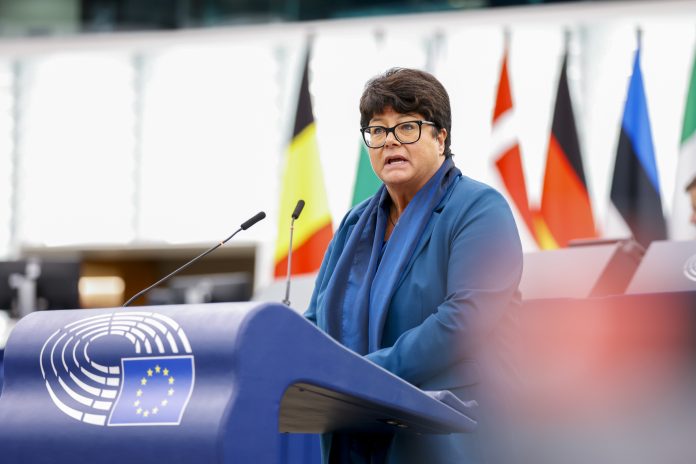MEPs adopted their stance on a law to fortify the openness and autonomy of EU media in light of rising threats to media freedom and the industry’s viability.
The Media Freedom Act, proposed by Brussels in response to mounting pressure on journalists in countries like Hungary and Poland, aims to safeguard reporters from political interference, safeguard their ability to keep sources confidential and promote media diversity throughout the bloc.
On Tuesday, the Parliament adopted the European Media Freedom Act with 448 votes in favor, 102 against, and 75 abstentions. This vote by MEPs establishes the Parliament’s position on the proposed legislation before negotiations with EU member states.
The Parliament’s stance mandates member states to guarantee media diversity and safeguard media autonomy from political, governmental, economic, or private interference. The MEPs aim to prohibit any external influence on editorial decisions and prevent pressure tactics on journalists, such as demanding source disclosure, accessing encrypted content on their devices, or using spyware to monitor them. MEPs suggest that spyware should only be used as a last resort to investigate severe crimes, such as terrorism or human trafficking, and only upon an independent judicial authority’s order.
Parliament has adopted the Act in response to the concerns raised by citizens. This action was taken to address the proposals put forth by citizens during the Conference on the Future of Europe. These proposals specifically focused on issues such as media, fake news, disinformation, fact-checking, cybersecurity (paragraphs 1,2), citizens’ information, participation, and youth (paragraph 4), as outlined in proposal 27 and proposal 37.
Transparency in media ownership
The Parliament has proposed measures to ensure transparency in media ownership, even for micro-enterprises, including the publication of information on their ownership structure and reporting on any funds received from state advertising and financial support, including those from non-EU countries.
Media freedom and large online platforms
To protect media freedom from arbitrary decisions made by large online platforms, MEPs recommend the creation of a mechanism to manage content takedown orders. This involves platforms processing declarations to distinguish independent media from non-independent sources. The media should then be notified of the platform’s intention to delete or restrict their content, with a 24-hour window for the media to respond. If the platform still deems the content non-compliant, it may proceed with deletion, restriction, or referral to national regulators. However, if the media provider believes the platform’s decision undermines media freedom, they can bring the case to an out-of-court dispute settlement body.
Economic sustainability
To ensure economic sustainability, MEPs recommended that member states provide public media with adequate and predictable funding through multiannual budgets. To prevent media outlets from relying solely on state advertising, a cap of 15% of the total advertising budget allocated by the authority in a given EU country should be imposed on public advertising for a single media provider, online platform, or search engine. MEPs also propose to make the criteria for allocating public funds to media publicly available.
A European Board for Media Services
MEPs also push to create a new EU body, the European Board for Media Services, through the Media Freedom Act. They want this board to be legally and functionally independent from the Commission and be able to act independently from it. Additionally, MEPs suggest establishing a separate “expert group” representing the media sector and civil society to advise this new board.
After Parliament adopted its position, negotiations with the Council on the final shape of the law can now begin.
“We must not turn a blind eye to the worrying state of press freedom worldwide, a trend that also affects Europe,” rapporteur Sabine Verheyen (EPP, DE) said ahead of the vote.
She stressed that media is “not just any business. Beyond its economic dimension, the media contributes to education, cultural development, and inclusivity in society. It protects fundamental rights such as freedom of expression and access to information.”
The rapporteur said that, with the European Media Freedom Act, MEPs have reached “an important legislative milestone to safeguard the diversity and freedom of our media landscape and our journalists” and taken an “important step in the protection of our democracies”.

